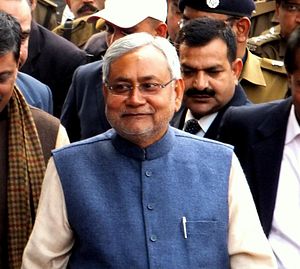At a time when Prime Minister Narendra Modi’s Bharatiya Janata Party (BJP) government is preparing to celebrate 100 days in office in New Delhi, the result of by-elections in four important states’ local elections have come as a bit of shock. It has tempered the mood of the Hindu right-wing party, which not long ago registered an impressive win in the national parliamentary elections.
The most shocking outcome for the BJP came from the state of Bihar where it lost six of the ten seats it contested. In Bihar, the BJP conceded defeat to the “secular alliance” of the Janata Dal (United, or JD(U)), Rashtriya Janata Dal (RJD) and the Indian National Congress (INC). These parties were almost decimated in India’s national parliamentary elections this May by the BJP, which won 31 out of the 40 parliamentary seats being contested in Bihar. In terms of proportionality, Modi’s party would have won eight out of ten seats in Bihar’s by-elections if it did as well as it did in the parliamentary elections.
The alliance of anti-BJP parties is a significant challenge to the BJP and brings into doubt the appeal of the prime minister, who was the architect of the BJP’s victory in the May 2014 general elections. The BJP lost by-elections in other parts of India as well as in Bihar. In the southern state of Karnataka, which the BJP won in May 2014, the BJP lost two out of the three seats it contested in the by-elections. In Madhya Pradesh, a central state, the BJP lost one seat of the three it contested, winning the other two. Madhya Pradesh is considered a bastion of the Indian right and the BJP did not lose a single by-election in that state for more than a decade until now. Congress also drew even in Punjab with the Shiromani Akali Dal (SAD), a party that rules Punjab in alliance with the BJP. Both SAD and Congress won one each of the two seats contested in Punjab.
Political analysts note that these losses, including the surprising loss in Madhya Pradesh, are a signal to the BJP that it cannot take its May victory for granted. While regional elections cannot said to be an indicator of the national mood, they do demonstrate some political realities throughout India. The message is loud and clear – the BJP cannot depend solely on “Modi magic” to sail through the polls to victory. Three months of BJP rule at the center have tempered the expectations of the people, many of whom expected quick results from Modi on issues like rising prices and the performance of the economy.
The results of the elections suggest that rather than the BJP losing votes, the non-BJP parties have combined their vote banks to great effect. In other words, political forces opposed to the Hindu right have aligned with each other. In the 2014 general elections, all the non-BJP parties lost badly in Bihar when they fought the elections separately. This prompted the non-BJP parties to come together in order to stop the BJP. The BJP’s victory was especially threatening to regional, caste-based parties. The result of the by-elections is clear: the political possibility of victory exists for non-BJP parties if they remain allied. When Bihar goes to the polls next year for state elections, the alliance of the JD(U), RJD, and Congress Party, if intact, will be a tough challenge for the BJP, which is now interested in coming to power in Bihar.
Most importantly, the beleaguered opposition, particularly the Congress, received a big morale boost from the outcome of the by-elections. The party won the Bhagalpur seat in Bihar, an urban constituency, for the first time since 1989. It made small but significant inroads in Madhya Pradesh and improved its performance in Karnataka and Punjab. Not long ago, the Congress Party lost badly in all these places. This victory for India’s grand old party comes at a crucial time when important states like Maharashtra, Haryana and Jharkhand are headed for local assembly elections in a few months. The win in regional elections will boost the morale of the party cadres who are in deep shock after the humiliating rout in May.
However, a larger message for national politics comes from the results in Bihar. If the success of the “secular alliance” is replicated in the state in the next year’s elections, then there is a fairly high chance that a similar strategy of non-BJP parties allying will be attempted in New Delhi too. However, the “secular alliance” also has inherent limitations. The leadership of the alliance in Bihar is still undecided. Nitish Kumar and Lalu Prasad Yadav, leaders of the JD(U) and the RJD respectively, each have large political ambitions. It would be difficult for either of them to concede the leadership of the alliance. Past attempts at alliances between parties have shown that many alliances fail due to the issue of leadership. Additionally, other than stopping the BJP, the alliance does not have any vision, especially on development issues. This is particularly important in Bihar, which has been reeling from poverty and economic backwardness for decades. An anti-BJP platform will not last long without a long term political program.
Nonetheless, the results of the by-elections expose the vulnerability of the BJP and the limitations of Modi’s appeal.

































